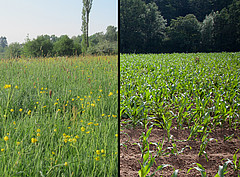For more species diversity:
European researchers develop recommendations for healthy grassland soils [06.06.17]
Agriculturally, ecologically, and culturally important grasslands make up 35 percent of Europe’s agriculturally used land area and are used mostly for livestock farming. But Europe’s grasslands are at risk, and they have been shrinking continually for many years. Scientists from all across Europe are now working to counteract this trend. Under the direction of the University of Hohenheim, they are analyzing grassland soils from northern Sweden down to the Portuguese Azores. The results will advance ecology research and enable scientists to make recommendations for politicians and farmers. The project “Generic bio-inventory of functional soil microbial diversity in permanent grassland ecosystems across management and climate gradients” has received a total of 1.65 million euros in funding.
More species diversity without economic losses
To enable plants to grow quickly, farmers often have to use fertilizers and plant protection products on their meadows and pastures. This can decrease the diversity and number of the native plant species with unforeseeable consequences for soil microbial life.
A team of scientists from various European countries seeks to find alternatives. The idea: By investigating the interaction between the diversity of plant species and the related functional soil microbial diversity, future recommendations can be given with respect to an appropriate grassland management adapted to diverse agro-ecological conditions.
With this strategy, nutrients are balanced, soil is healthy, soil microbial life and plant species diversity are promoted, and the area can continue to be economically used for livestock farming - ideally without any application of chemical products.
Measuring healthy soil
To reach this goal, the researchers first need to know what makes soil healthy and which plants promote microbial diversity in soil. The scientists will take soil samples from meadows and pastures in Sweden, Germany, Switzerland, Portugal, and on the Azores. All team members then examine the samples in regard to various soil ecological aspects.
The soil samples are gathered and the various measurement and analysis processes are coordinated and documented precisely in all partner countries. They will then use that information to create a handbook as an orientation for research institutions throughout all of Europe to observe the state of plants’ and soil microorganisms’ species diversity in grasslands in the future.
The team will also take into consideration the varying climate and soil conditions in different parts of Europe, as depending on the agro-ecological zone, very different plant species occur in the grasslands and have corresponding effects on the soil microbial diversity.
Recommendations for policies, agriculture, and bioeconomy
The project is essentially focused on basic research, but the knowledge gained is to serve as a basis for policy decisions on a national and European level. Besides the appropriate framework political conditions, the project also aims to show economic incentives for preserving the grasslands.
The measurements will result in specific recommendations that can be made to the farmers. In the long-term, the results of the project could also benefit the bioeconomy, for example by developing and marketing special seed mixtures or biological fertilizers for sustainable farming of the grasslands.
Expanding international scientific competence
In the European team, many different competences come together. The project participants are:
- Hans-Ruthenberg-Institute at the University of Hohenheim, Germany: Focus: importance and occurrence of certain bacteria and fungi involved in soil nitrogen and phosphorus cycles
- Swedish University of Agricultural Sciences: Focus: soil chemical properties
- Agroscope Institute for Sustainable Sciences, Switzerland: Focus: microbial species diversity
- University of Lisbon, Portugal: Focus: Activity of soil microbial enzymes
- University of the Azores, Portugal: Biostatistical data analysis
Text: Barsch / Klebs
Contact for press:
PD Dr. Frank Rasche, Universität Hohenheim, Fachgebiet Agrarökologie der Tropen und Subtropen
T 0711 459 22385, E frank.rasche@uni-hohenheim.de


